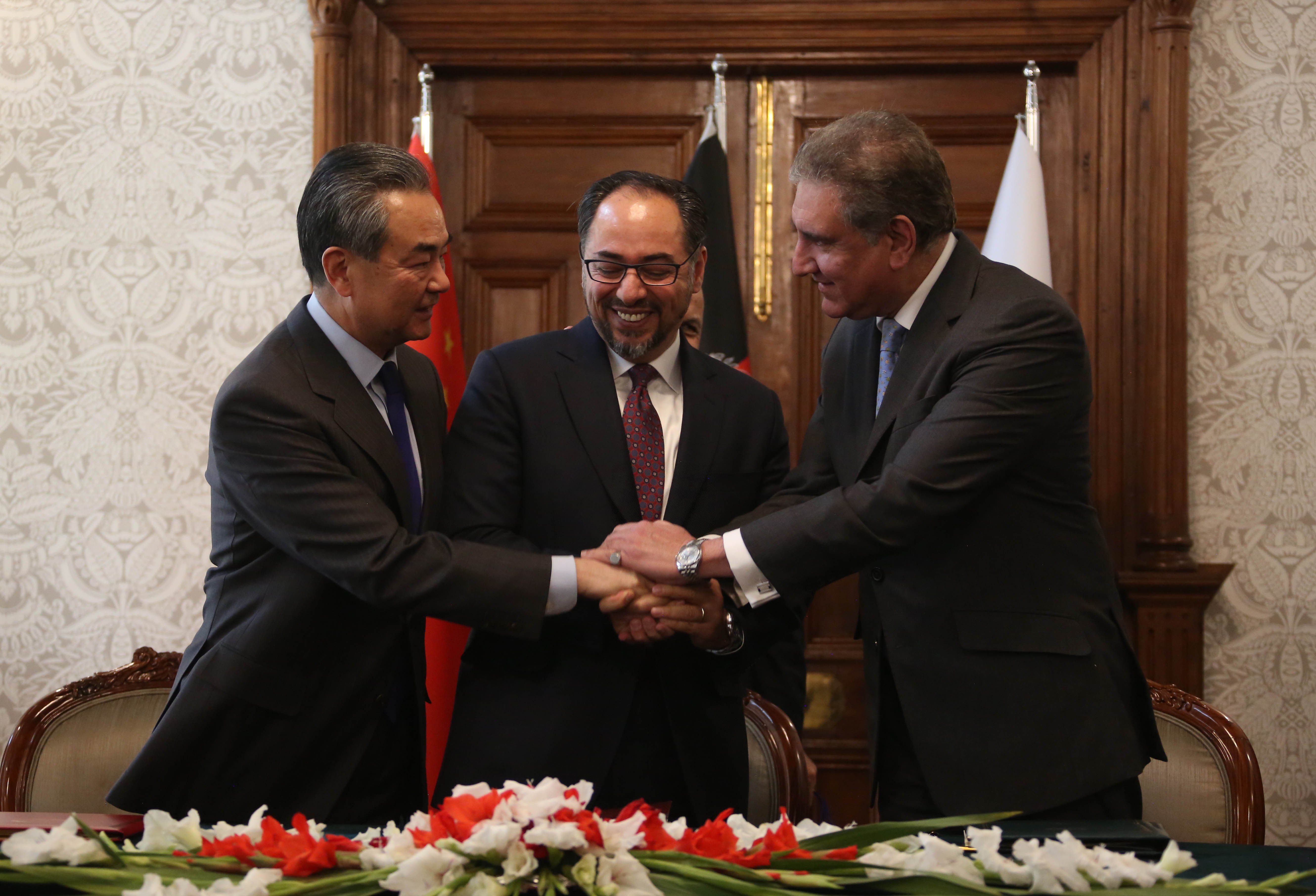China paving the way for peace and development in the region
China is leading peace and development efforts in the South Asia region, including crucial task of building sustainable stability and economic growth in Afghanistan.
By Muhammad Zamir Assadi
The second trilateral meeting between China, Pakistan and Afghanistan has reaffirmed their commitment to further strengthening their relations, deepening cooperation and advancing connectivity under the Belt and Road Initiative (BRI), the Regional Economic Cooperation Conference on Afghanistan (RECCA) and other regional economic initiatives.

Chinese State Councilor and Foreign Minister Wang Yi, Afghan Foreign Minister Salahuddin Rabbani and Pakistani Foreign Minister Shah Mahmood Qureshi [L-R] shake hands after signing an agreement during the 2nd China-Afghanistan-Pakistan Foreign Ministers' Dialogue in Kabul, Afghanistan, on Dec. 15, 2018. [Photo/Xinhua]
The framework of cooperation was established one year ago with help from China and the countries agreed to jointly continue their efforts in three areas of trilateral cooperation – political mutual trust and support reconciliation, development cooperation and connectivity as well as security cooperation and counter-terrorism.
The efforts of China show that it is committed to peace and development in the region. It upholds the principle of amity, mutual benefit and inclusiveness in its diplomacy, seeks friendship and partnership with its neighbors and is working to build a peaceful and prosperous region.
The trilateral session has also helped both Pakistan and Afghanistan reduce the trust deficit created in the past year and understand the needs of security and development, which are essential for future stability and growth.
A consensus has been formed among the three countries that dialogue and cooperation will be pushed forward to enhance strategic mutual trust with the view to promote the security of all countries in the region. The countries also realize that disputes should be settled through peaceful means by the countries in the region and without the interference of other countries.
To pursue sustainable security, the three countries will work hard to improve people's lives, narrow the wealth gap, promote common development and create lasting security by addressing both the symptoms and root causes of the problems.
China has stepped up to work with all the countries in the region to explore new partnerships and alliances under the framework of the BRI, which will undoubtedly have immense dividends for regional and global peace and prosperity.
Afghanistan's peace has a direct impact on the region's stability and prosperity and in this regard, China and Pakistan have been enhancing their cooperation to promote the reconciliation process and build a peaceful region.
With the success of the first phase of the China-Pakistan Economic Corridor (CPEC) that has emerged as the flagship project of the BRI, economic links have received new impetus. This might well prove to be beneficial to Afghanistan.
Afghanistan will certainly need to explore ways to get benefits from the CPEC, which has become a symbol of recognition of development for the South Asian region. Moreover, the CPEC will provide an opportunity for Afghanistan to develop its economy and integrate it with the larger region.
The development process under the BRI and CPEC in Afghanistan will also help eliminate terrorism and generate employment opportunities in the country for unemployed youth.
The development of both export-driven and domestic consumption-driven industries should also be a major goal for Afghanistan and, in addition, integration with the CPEC should be a major part of that goal.
Afghanistan's strategic efforts to develop and modernize its industrial base should, therefore, include CPEC.
Afghanistan has substantial trade volume with China, most of which is in the form of imports. Given the increasing competitiveness of Chinese goods, it is likely that Afghanistan's import trade with China will grow.
In this case, the CPEC has emerged as an alternate route for Afghanistan to trade with China through Pakistan and these states have a shared interest in stabilizing Kabul.
By becoming a part of the CPEC, and the BRI in general, Afghanistan will have the opportunity to stabilize its economy by enhancing its trade opportunities. It will also be in a good position to reap the benefits from the industrialization of Pakistan under the CPEC.
The author is a Pakistani journalist who graduated in China development studies from Renmin University of China. He is also a media fellow at the China South Asia and South East Asia press center.

